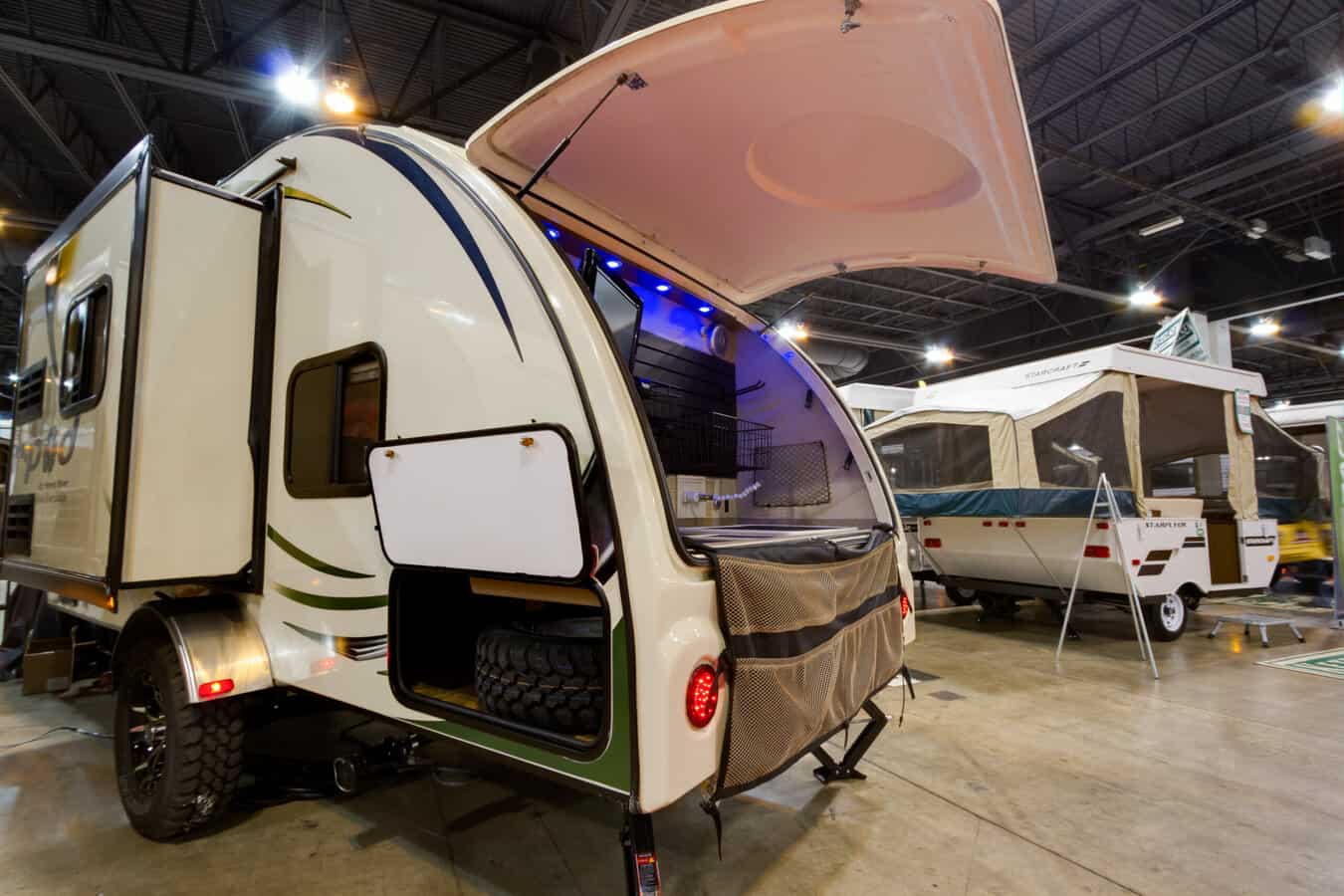
Do Gun Laws Apply When You’re Traveling Across State Lines?
Plenty of RVers choose to travel with guns for personal protection or for hunting. Although it may be legal to own and operate your guns in your home state, things become more complicated when you cross state lines. That’s why it’s important to understand the various gun laws across the country.
Some US states are fairly lenient when it comes to gun laws. But they may have a couple of restrictions on ammo type, holster designs, etc. Others are much more restrictive, especially towards visitors from other states. In order to comply with the different gun laws, you’ll need to thoroughly research each state you plan to visit or drive through.
You’re responsible for complying with the different laws, but there are some general guidelines that will provide a good starting point. The federal laws are fairly easy to follow, so law-abiding gun owners will be able to travel without worry. We’ll delve into the different factors of this problem below, so read on!
Requirements for interstate gun transportation
The federal rules on interstate travel are pretty loose. You still need to abide by individual state laws, but if you follow the list below, you’ll be protected from severe legal action.
- You must have the necessary license/permits/proof of ownership to prove that you can legally carry each gun in your possession.
- All of your guns must be legal in your destination. This means that you must abide by the gun laws of the states you travel to, so you can’t bring a firearm that’s restricted. However, you can travel through states with restrictions as long as you don’t plan to stay there for long. Keep the guns safely stored in your vehicle during this passage.
- Finally, your gun must be unloaded and out of arm’s reach while you drive. The glove box doesn’t count because it’s an unsecured storage area that’s too easy for a driver or passenger to reach. Separate storage areas for your ammo and guns are recommended but not required.
Following these interstate travel rules will help you reach your destination without hitting any snags. If you are stopped or inspected by a law enforcement officer, proper gun storage will ensure that they don’t see you as a threat.
Additional restrictions
There are a few federal laws that you can’t get around, though. For instance, if you are banned from owning firearms, this rule applies to any state in the country. You could get into serious trouble if you are caught with a gun once you have been deemed unfit to hold one.
Buying guns in other states is also a tricky situation. The seller will check your ID to verify your home state. They will have to comply with your home state’s laws, even if certain practices are legal in their region. In some cases, you may have to comply with a specific waiting period before they will give you the gun.
Certain types of guns and ammo may be restricted as well. However, long guns like rifles and shotguns are generally fair game.
State gun bans/laws
Most travelers won’t have any issues with meeting the federal gun requirements. The main issue emerges when you enter a different state. Every state has its own laws, and some of them are enforced very strictly.
Some states have little to no restrictions on guns and ammo. The easiest states for gun owners to travel to or through include:
- Alaska
- Arizona
- Georgia
- Idaho
- Iowa
- Mississippi
- Montana
- Nebraska
- New Hampshire
- New Mexico
- North Dakota
- Ohio
- Oregon
- South Dakota
- Utah
- West Virginia
- Wisconsin
- Wyoming
These states have no major restrictions on specific guns, ammunition, or parts. However, while these states might be more lenient, they still might have specific regulations that travelers need to be aware of.
For instance, many states ban the use of machine guns, explosive ammo, armor-piercing rounds, and more. Some states require a permit for concealed carry, some don’t, and some states recognize permits from other states while others don’t.
Handguns and long guns are easier to travel with, but there are also different laws about how you can carry these weapons. Some states ban things like wallet holsters and other concealed carry equipment.
Again, performing your own firearm research is crucial! What is legal in one state may be banned in another.
You can view the latest gun laws by state on World Population Review.
Tips for traveling with guns
Now that you know some of the rules and restrictions that you might deal with, you should have a good idea of how to plan your next trip. Laws aside, there are a few general safety tips that will help you avoid accidents and have a more enjoyable trip.
Use a gun safe
One of the most important pieces of equipment for a gun owner is a good safe. You need a secure place to store your firearms when they’re not in use. If they’re easily accessible, they could be stolen or accidentally fired by visitors and children.
If you travel in an RV, there should be a bit of free space where you can install a safe. The specific size and security style will vary based on your needs, but anything is better than nothing. Ensure that you use a strong password/combination and don’t share it with others.
You may also want to store your ammo and guns in separate places to further deter thieves.
Take firearm safety courses
Next up, it’s important that you follow general gun safety procedures. These items are powerful, and it’s easy to make a deadly mistake if you’re not properly trained. Take a course on firearm safety so you know how to safely carry, store, and fire them.
If other people in your RV might use these guns, they also need to participate in these courses. Some states may even require prospective gun owners to take educational courses to ensure that everyone can follow basic safety practices. It never hurts to get a little shooting range practice in, either!
Don’t overpack
Finally, you need to be thoughtful about which guns you travel with. It’s not usually necessary to travel with a huge collection of different sizes and styles. These will usually just take up space in your RV and will make you a bigger target for legal action.
The more guns you have, the more likely you are to get in trouble with out-of-state law enforcers. Pack light and only bring the firearms you think you’ll actually need.
In the end, you’re responsible for knowing and following the various laws of each US state. Comply with the federal guidelines for basic protection, but be sure to research each area you plan to visit as well.
Get tips from other RVers
One of the best parts about RVing is engaging with the community of traveling enthusiasts. iRV2 forums allow folks to chat with other RVers online, and get other perspectives on everything RVing, including products, destinations, RV mods, and more.
Related articles:





My understanding if you have a CC and are going through Illinois, you can have your gun holstered inside your vehicle, but cannot step out of it with it. You must secure it in the glovebox or other locked box, then exit the vehicle. If you step out with it, you can be in trouble.
Why does one even require a gun in the first place? Untold millions enjoy RVing without firearms, what are people afraid of?
No one says they are required. Some folks exercise their rights and those are the folks who can protect those who do not have a gun when the bad guy has one. Bad guys will always have guns. It’s good when the good guys have them too.
I’m so happy for you that you have never been threatened inside your home/Rv with your life. I have. If not for my gun, which I didn’t have to shoot, just pull, I may well not have been here. 1 1/2 million times per year a legal gun owner stops a violent crime. Most gun deaths are suicides. There’s more than one way to do that. Violent criminals do not care what the gun laws are. They have guns legal or not. I prefer not to be at the mercy of those evil people. CC permit holders are over 700% less likely to commit a crime than the average person.
Missouri is a Constitutional carry state; I am surprised it is not on your list. Another good website is:
https://handgunlaw.us/
Excellent article! Thank you for your research on this important safety topic for many of us! Also, excellent comments advising on the perils of states not adhering to constitutional rights and on leaving the U.S. border.
I installed a gun safe in my RV for storing my gun when I am out of the RV. It is also good for extra cash. I have a concealed carry license and so does my wife. I think it is a good idea to have protection when you are staying overnight somewhere strange or in a Walmart or truckstop parking lot. I also have done insurance to protect me if I have to fire my gun at someone in a case of emergency.
Someone may have already mentioned it but I would suggest you go to a source such as the USCCA to get all your gun and ammo rules and laws as they are in this business and the laws and rules are updated continuously.
It’s funny you said “The glove box doesn’t count because it’s an unsecured storage area that’s too easy for a driver or passenger to reach. “, because Illinois says firearms need to be cased and unloaded and a center console or glove box IS considered a case and is an acceptable storage place for your unloaded firearm.
This discussion only concerns motorhomes. It does not refer to TT’s, 5th’s or other towable campers. When you carry firearm in one of these it is not able to be reached by anyone in the tow vehicle. This is YOUR HOME. Laws about firearms in the home now apply. You can refuse authorities entry to your HOME. Only with a search warrant stating what they are looking for. I don’t believe any vehicle cab rules apply in this case. Loaded and laying out on a table etc. is a privilege of being in your home as it is not a motor vehicle. If I am wrong on this matter, please post or contact me with any laws that effect traveling in this matter. Thanks, 3’s & 8’s. Bing
Good point. In SC where I live you can carry a loaded firearm in your unlocked center console or glovebox
It’s fair to say that Alaska has lenient gun laws, but unless you are taking the Alaska State Ferry from Washington State, you will not be able to take handguns with you. The drive requires a long transit through Canada, and you will not be allowed to bring a handgun into the country. Your only option will be to mail it to your destination and pick it up there. Don’t consider trying to smuggle one through. You may get away with it, but if you fail to declare and are subjected to a search, not only will you be arrested, but your gun will be seized and you will be banned from Canada for a lengthy period.
A very good resource is USCCA (US Concealed Carry Association), which has an app that covers reciprocity laws for all 50 states.
Better yet, Just Leave Them Home!!
Ummmm NOT AN OPTION
It’s important to remember that the US Constitution only applies to certain states.
The SCOTUS will likely remedy that, but for now, your Rights may be infringed in blue states.
Do not take firearm, ammunition, or even empty cartridge case south of US border.
Firearms cannot be taken into Canada without express permits.
Non semi automatic long guns can be transported through to Alaska if dckard, secured, and permit paid for. Sidearms may not be transported
We find that Western Canada transport of firearms laws are not applicable in eastern Canada and had to find an FFL in Calais, Maine to ship shotgun home.
If you do have a fire arm in the RV and get stopped in IL., do not step out of the vehicle. Ones you are out of the RV you are subject to IL gun rules and if your out of state that makes it worse.